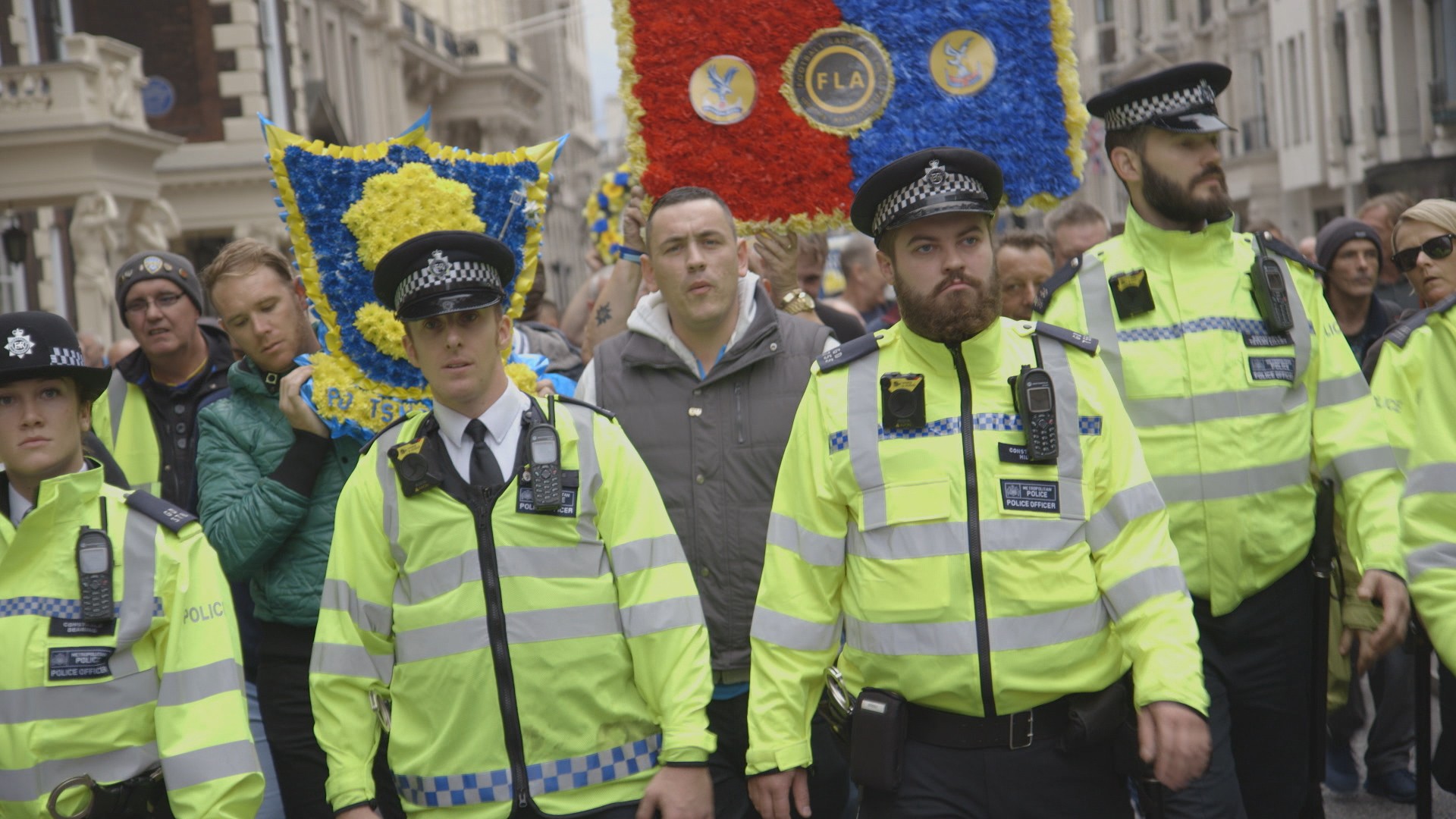This article originally appeared on VICE BelgiumTonight, Belgium's national football team, the Red Devils, will play England in their final group game of the World Cup. The stadium where the game will take place is in Kaliningrad, the Russian host city that is by far the closest to Belgium.In theory, the match today won't just be fun for regular Belgium fans, but it should be a dream for Belgian hooligans, too. Fighting England's hooligans – who have such a rich history in the art form – is considered an honour among some in the international hooligan scene. Add to the mix the fact that the Red Devils are actually finally pretty decent this year, and you'd think every hooligan in Belgium would be heading to Kaliningrad this evening.
Advertisement
But in reality, very few made the trip, if any at all. That's because Belgian hooligans aren't rooting or fighting for Belgium as one country or one team. Culturally, Belgium is split between the Dutch-speaking north of the country (Flanders) and French-speaking south (Wallonia). Generally, many Belgian hooligans are openly nationalist, but that means they consider themselves to be either Flemish or Walloons, not Belgian. Taking on England fans in Russia would require them support a team they don't recognise, representing a country they don't feel part of.That sentiment isn't only held by ultras; during the 2014 FIFA World Cup, the president of the Flemish parliament, nationalist Jan Peumans, spoke about how much he hates the increased number of Belgian flags that pop up everywhere during these kinds of events.
A member of Casuals Against Terrorism steps over a memorial for the victims of the terrorist attack in Brussels. Photo by Patrik Stollarz/AFP/Getty Images
The Belgian national teams of the 1990s and 2000s were so bad that nobody really enjoyed watching them play, let alone getting punched in the face in their honour. When Belgians think back to that era, it mostly brings to mind images of half-empty stadiums where the team couldn't manage a draw against a brand new Balkan country on a dreary Tuesday afternoon.Traditionally, hooliganism in Belgium operated only at club level. Those ultras groups never considered coming together under a single banner – until, that is, Easter of 2016, and for reasons wholly unrelated to football.
On the 27th of March, 2016, five days after 32 people were killed and over 300 were injured in a terrorist attack in Brussels, Belgian far-right hooligans united and held a rally under the banner "Casuals against Terrorism". Similar movements have popped up across Europe in recent years. In 2014, German far-right football hooligan groups came together and formed "Hooligans Against Salafists", organising a number of violent, anti-Islamist protests across the country. In the UK, the Football Lads Alliance have held a number of protests they claim are against all forms of extremism, though their rallies have had a particular focus on Islamic terrorism.
Advertisement
The rally in Brussels in March of 2016 quickly got out of hand, as members of Casuals Against Terrorism made Nazi salutes, bothered Muslim women in the crowd and eventually clashed with police and locals. Suddenly, Belgian hooligans were a topic of conversation throughout the country, even though – up until that point – nobody thought Belgian hooliganism was really a thing on a national level.In 'T Pallieterke, a Flemish nationalist magazine, a hooligan from Bruges explained why he joined Casuals Against Terrorism. "While we are staunch Flemish nationalists, this issue effects all of us," he wrote. What brought national unity to Flemish and Walloon hooligans, he argues, wasn't football or a sense of national identity, but what these guys saw as the direct threat of terrorism.
WATCH: Who Are the Football Lads Alliance?
While hooliganism is often related to or associated with extreme right and nationalist movements, the Belgian hooligans I speak to tell me there's a pretty diverse range of political views in their scene, depending on the club they're affiliated with. Thomas*, a known ultra, explains that Bruges fans, from north-west Belgium, are "really very right-wing, but Antwerp fans are the opposite"."I don't care if Belgium get knocked out in the group stage," says Xander*, who used to be affiliated to the Beerschot-Wilrijk FC ultras group. "Most of us feel Flemish rather than Belgian anyway."
WATCH: Who Are the Football Lads Alliance?

While hooliganism is often related to or associated with extreme right and nationalist movements, the Belgian hooligans I speak to tell me there's a pretty diverse range of political views in their scene, depending on the club they're affiliated with. Thomas*, a known ultra, explains that Bruges fans, from north-west Belgium, are "really very right-wing, but Antwerp fans are the opposite"."I don't care if Belgium get knocked out in the group stage," says Xander*, who used to be affiliated to the Beerschot-Wilrijk FC ultras group. "Most of us feel Flemish rather than Belgian anyway."
Advertisement
It's an interesting sentiment, since in other countries hooligans can often seem desperate to link their violence to some vague notion of national identity. The makeup of club-based hooliganism in Belgium, however, makes that almost impossible. According to Jonathan*, a member of the Genk ultras, his fellow ultras are way too multicultural to adhere to a Belgian identity. "Many members of our crew have Italian, Romanian, Turkish or German roots," he explains. "During international tournaments they support their own countries. The remaining Flemish and Belgians do watch, but we aren't going to fight on behalf of Belgium."Jonathan wouldn't even speculate on who he thinks would be willing to fight for Belgium. "If I give you the wrong names, things could go very wrong for me."
A flare goes off in the middle of a group of Belgian fans during a recent friendly. Photo: AMA Sports Photo Agency / Alamy Stock Photo
Thomas doesn't expect any violence during the World Cup. "The trouble with Russia is that nobody knows what their ultras are capable of," he points out. Russian hooligans are known to be trained and organised, and, as Thomas puts it, "of a different order". He thinks that after a large number of Russian hooligans attacked England fans during the 2016 European Championships in France, few Belgian ultras would want to pick a fight with them, let alone risk it for Belgium.Belgian authorities aren't expecting any trouble at the England game, either. "We don't have a culture of hooliganism tied to the national football team," says Gaetan Willems of the Ministry of the Interior's Voetbalcel (Football Unit). But two years ago, in Lille, two days after Russian ultras attacked fans in Marseille, a few Belgian hooligans were arrested for causing a disturbance when Russia and England played nearby.
Advertisement
"Yeah, Lille was fun," remembers Maarten*, one of the founders of Casuals United Belgium, a group that seems to be inspired by England's Casuals United, who are affiliated to the far-right English Defence League. "A quick drive, a few beers with our crew beforehand. But doing the same in Russia really is a bridge too far. All things considered, most of our lot lack the capacity to go up against the Russians or the Germans."
Maarten hopes this will eventually change. "I do always wonder why we can't do as the English do and work together," he says. "If you bring all the Belgian casuals together, you get quite a strong crowd. But the reason we have trouble mobilising people for the World Cup and international tournaments is that we are far less nationalist. We are a broken country, and I'm worried that will never change."Guy Theyskens, the Federal Police's Director of Administrations, explains that some Flemish hooligans watch the Red Devils live, but behave completely differently when they watch the national team than they do with their club sides. "Maybe it's because Belgium haven't been that successful in the past," he suggests. Belgian police have sent a few spotters to the World Cup to keep an eye on things, but Theysken doesn't think many of the country's most prominent hooligans will even bother going to the England match."In Belgium, we are constantly being pitted against each other," Maarten says. "If anything happens, we always blame the other side. If only we could stop all that, maybe we'd have a country" – and the hooligans to go with it.*Names have been changed to protect identities.See here for more coverage of the 2018 FIFA World Cup.

